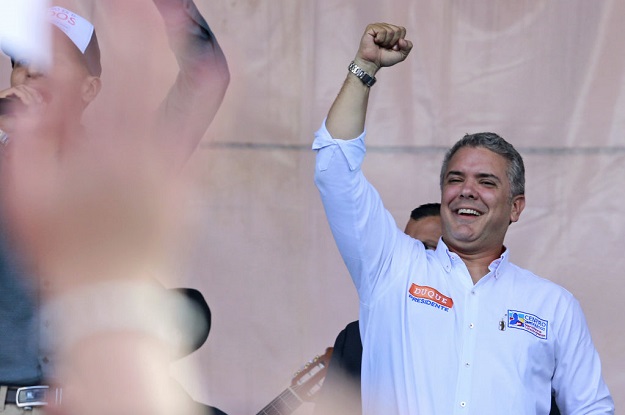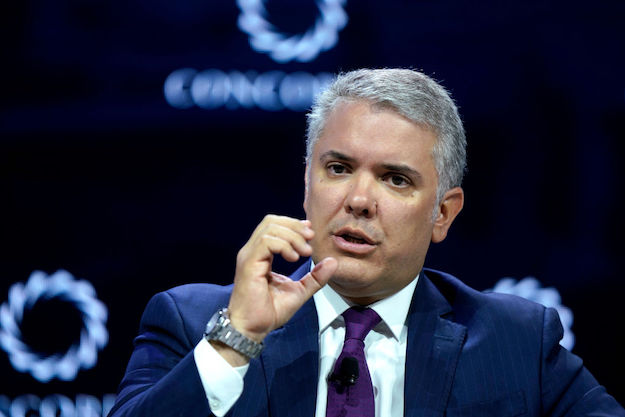This piece has been corrected.
On Sunday, Colombians will vote to elect a new president. Polls suggest that Iván Duque of the Democratic Center, a charismatic young senator and protégé of former president Álvaro Uribe, will receive the highest number of votes, but not the absolute majority needed to avoid a second round. Polls also suggest that in a run-off scheduled for early June, he will handily defeat the likely second-place finisher Gustavo Petro, a leftist former mayor of Bogotá, who has channeled the anti-establishment fervor currently coursing through Colombia and other Latin American countries.
National polling in Colombia has been wrong before, most recently concerning a 2016 plebiscite on Colombia’s peace agreement with guerrillas of the Revolutionary Armed Forces of Colombia (FARC). (Colombians voted ‘no’ by a slim majority after polls suggested they would approve the accord by a margin of almost 2-1). But this time, numerous surveys have indicated a consistent result: Duque is ahead of the pack, no matter which opponent he faces in a second round.
What might a Duque victory mean for the future of U.S.-Colombian relations? The easy answer is that anti-narcotics issues will again dominate in light of record levels of coca cultivation in Colombia in the years since the FARC negotiations began. On this issue the new government in Bogotá, the Trump administration, and a bipartisan majority in Congress will be in agreement. More potentially divisive in both countries, however, is the Democratic Center’s antipathy to the peace accord, which Duque, Uribe, and other prominent political figures have roundly criticized for what they see as its excessive lenience toward the FARC in judicial and political terms. Duque and others have also criticized the accord’s provisions for voluntary eradication of coca, promising to step up forced eradication, and to seek adjustments in provisions that allow FARC members to hold political office before they have been cleared of egregious crimes. The April arrest of FARC leader Jesús Santrich on charges of arranging cocaine shipments for Mexico’s Sinaloa cartel has further discredited the peace process in the eyes of the general public. In addition to being part of the FARC team that negotiated the peace agreement, Santrich was due to take up a seat in the Colombian Congress as part of a special allotment to the guerrillas.
The peace deal in Colombia is deeply polarizing – a fact reflected in the plebiscite’s defeat by some 53,000 votes, less than half a percent of the total cast. But Duque has mostly focused on other issues, in light of opinion polls demonstrating that issues of corruption, unemployment, and the quality of health care and education together constitute the principal concerns of nearly 70 percent of Colombian voters. Notably, according to a March 2018 survey by the Colombian polling firm Invamer, only three percent of Colombians consider the implementation of the peace accord, or the conclusion of negotiations with the smaller National Liberation Army (ELN), a top priority. Just as revealing, however, is that only 1 percent of the public considers narco-trafficking a main preoccupation, despite the surge in coca and the fact that Colombia continues as the world’s top producer of cocaine.
The poll numbers suggest a core challenge for Colombia’s next president. Domestically, he will have to navigate the disconnect between the central priority of U.S. policy—stemming illegal narcotics production and trafficking—and the issues for which he will be accountable in the eyes of the public. Similarly, in light of the conservative antipathy in the United States towards public spending on social welfare, Duque will have difficulty looking northward as he seeks to address Colombia’s deep social deficits and inequality. Indeed, the strains on Colombia’s fiscal resources and social infrastructure will only worsen as hundreds of thousands of Venezuelans continue to stream into the country to escape Venezuela’s economic and social collapse. U.S. and other international assistance will help, but not to a degree commensurate with the problem’s dimensions.
Complications from the FARC deal
An additional difficulty for Duque and his team is that the peace accord retains broad support in the United States, Europe, and Latin America as a whole. International accolades for President Juan Manuel Santos, including a Nobel Peace Prize, do not just recognize an individual; they also credit a process that brought 50 years of brutal armed conflict to an end in exchange for political concessions. The peace agreement embraced a vision of a more inclusive Colombia, especially with respect to long-neglected rural areas. It held the promise that, for the first time in Colombia’s history, the country could be integrated not only territorially, but also socially and in development terms.
It has not worked out that way. The Santos government has been slow and bumbling in filling the vacuum of power left by the FARC’s demobilization. Colombia continues to lack a state presence – in terms of security and civilian institutions – in vast areas of Colombia’s rugged terrain. These areas bore the brunt of the armed conflict and continue to fester with insecurity, lack of basic infrastructure, and overall neglect. Violent competition among criminal groups for control of areas vacated by the FARC has produced new waves of displaced people. According to the governmental Unidad de Víctimas (Victims’ Unit), in the year after the peace accord was signed, over 54,000 people were forced to flee their homes, mostly along drug trafficking routes on Colombia’s Pacific Coast. The countryside has also seen a surge in murders of social activists and human rights defenders – 282 between January 2016 and February 2018, according to official figures. The death toll has also included 44 demobilized FARC combatants and 18 of their relatives between November 2016 and April 2018, according to the U.N. While homicides in Colombia have fallen drastically in the last fifteen years, they increased nationwide by seven percent in the first trimester of 2018, and by over 200 percent in 12 different regions.
The Colombian government has also been sluggish in designing and implementing a plan to reintegrate demobilized FARC combatants. There has been some progress – thousands of former guerrillas have opened bank accounts for the first time and the government and private sector have come together to provide funding for productive projects. But the U.N. and others continue to sound the alarm that insufficient reintegration, especially of mid-level commanders, risks a different form of FARC reintegration, into the lucrative criminal economies that have long morphed one form of violence into another throughout Colombia’s history.
The commander of Colombia’s armed forces, General Alberto José Mejía, estimates that the number of FARC dissidents (those who refused to demobilize and those who rearmed) has climbed to 1,200, while others claim that the number is almost double, and that a re-armed FARC has a presence in more than half of Colombia’s departments.
An opportunity for the next leader
Establishing effective state control in rural areas – bringing effective authority as well as economic opportunity to all areas of the countryside – will be key to Colombia’s future national security and development potential. It is also essential to making serious headway against coca, cocaine production, and Colombia’s other illegal economies. This is not a pro-peace accord agenda or an anti-peace accord agenda, but a core unresolved security and development challenge that Colombia and the United States must work together to resolve. Indeed, extending the legitimate authority of the state was the original goal of the bipartisan Plan Colombia launched over 17 years ago. The persistence of these core challenges reveals that the success of Plan Colombia was oversold, even if it did create the military conditions for successful negotiations with the FARC.
Finally, the new Colombian president will need skill to navigate the partisan divides in Washington. Drug war hawks in the Trump administration and Congress may seem like the most natural allies. But it is worth remembering that only when the Colombian government embraced a wider agenda that included human rights and the needs of underserved populations did true bipartisanship flourish.
If elected, Duque will inherit a political landscape, both at home and in the United States, marked by deep political divisions. But by committing his administration to expanding and consolidating state presence with the goal of security as well as development, he could transform the peace accord from an issue that polarizes into a new vehicle for consensus.
A previous version of this article misstated the number of women running as vice presidential candidates. Duque, Petro, Humberto de la Calle, and Sergio Fajardo each have women as their running mates.
Arnson is Director of the Latin American Program at the Woodrow Wilson Center. Shenk is a research assistant in the Latin American Program.








